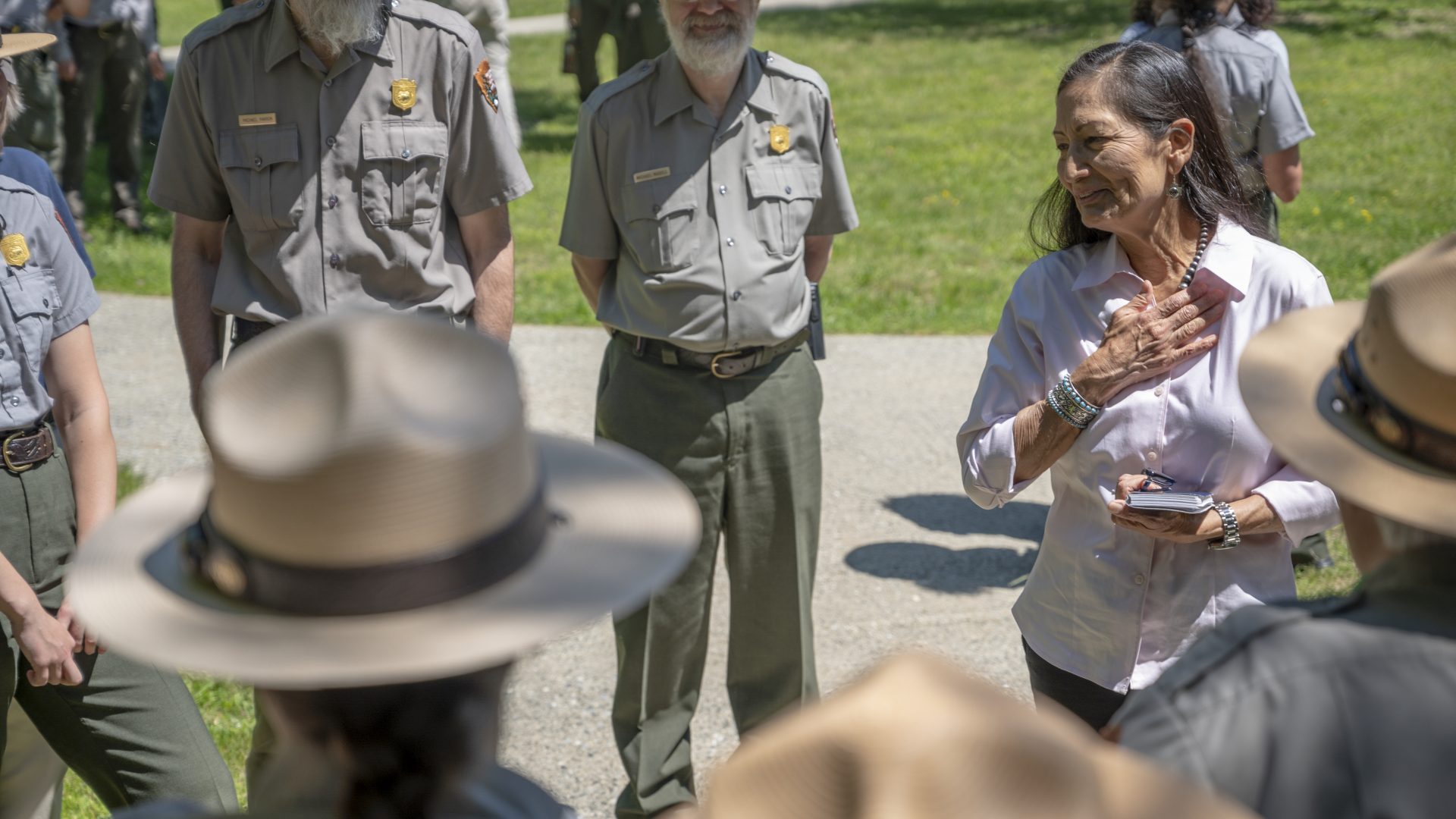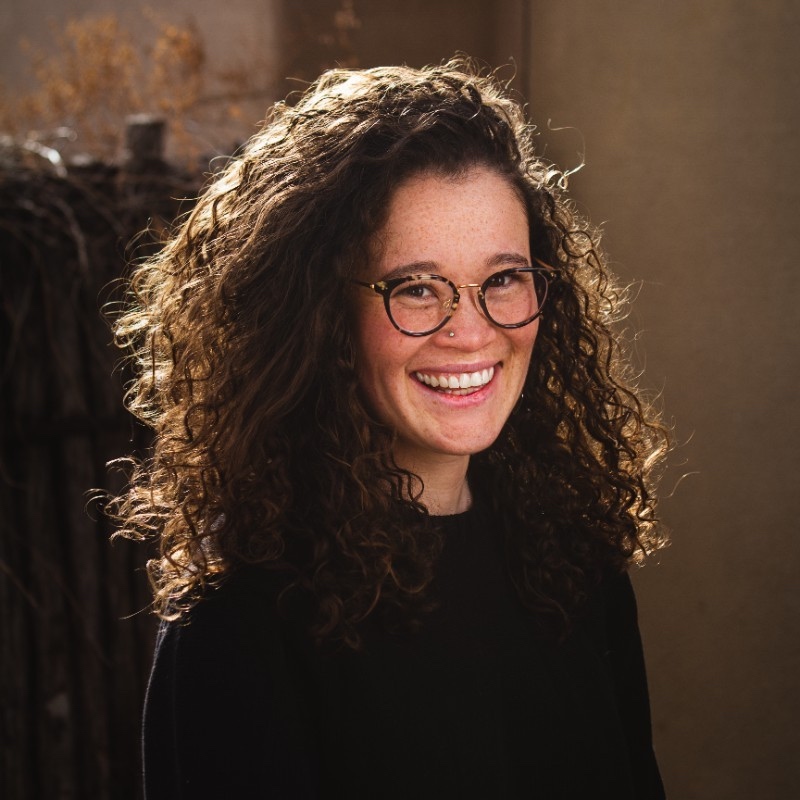
Deb Haaland, the first Native American cabinet member, is taking on sustainability, Tribal co-management, fossil fuel extraction, and the history of Native boarding schools in America.


Deb Haaland, the first Native American cabinet member, is taking on sustainability, Tribal co-management, fossil fuel extraction, and the history of Native boarding schools in America.
Going to a US national park? Leave your plastic bottles at home and thank Secretary of the Department of the Interior Deb Haaland. (P.S., don’t be phased by the job title “Secretary of the Department of the Interior”—it’s really just a fancy way of saying “the person responsible for the management and conservation of most federal land and natural resources” in the US.)
When Deb Haaland was appointed Secretary of the Interior in March 2021, it was cause for celebration. A former Democratic Congresswoman from New Mexico and tribal member of the Pueblo of Laguna, Secretary Haaland is the first Native American in history to hold a seat in the US President’s cabinet.
And we can now celebrate her for the policies she’s enacting, just a little over a year since her appointment.
Last month, the Department of the Interior shared that all single-use plastics (looking at you, water bottles and damned straws) would be banned and phased out of use in all public lands—including national parks, state parks, national monuments, and the like.
The order also requires the department to employ sustainable alternatives to the plastic being removed, like compostable or biodegradable materials.
In her official statement, Haaland says that the Department of the Interior needs to set the tone to enact sustainable practices, to ban others, and “to do better for our Earth.”
By 2032, there will be not a single plastic bag or water bottle in sight throughout the country’s most iconic outdoor destinations. (Although we recommend you get a 10-year jump on it and enact a personal single-use plastic ban while in nature, so pack your favorite water bottle for your next trip.)
RELATED: What’s lurking in Lake Tahoe? A ton of trash.
Halaand’s announcement of the plastics ban is slightly bittersweet, though. Her secretarial order undoes a Trump-era rule banning plastic bans. But to improve the order, Haaland simultaneously established a Climate Task Force to coordinate action across the department on efforts like shifting to renewable energy sources.
There is a laundry list of other impactful policies that Haaland has prioritized in the past year, including a promise for $150 million in funding for parks across the country, particularly urban parks.
Secretary Haaland and the Biden administration have also wielded the power to grant or withhold leases for oil and gas drilling on federal land. After the moratorium on new leases that President Biden signed was overturned by a federal judge, the administration enacted a new way to make extraction slow down. In April, it was announced that although selling permits would resume, it would be at a higher price for a greatly reduced land area, and using a review process that considers tribal input and climate impacts.
While slowing climate change has been a meaningful impetus for many of the recent changes for US public lands, healing Tribal relationships has also been a priority.
Haaland’s Interior Department has also established the Missing and Murdered Unit at the office of Justice Services within the Bureau of Indian Affairs. Indigenous women go missing at about double the rate of white women in the US, and in some counties are murdered at rates as much as 10 times higher than the national average.
The effectiveness of the new Unit is still in question, though, and some early reporting by the Guardian suggests they’re still struggling to work effectively with tribal police and the other federal agencies involved in crimes on Tribal land.
Additionally, Secretary Haaland’s Interior Department has begun a truth and reconciliation-esque process to understand the scope and legacy of the trauma inflicted on an entire generation of Native people by federal boarding schools in the past.
The Federal Boarding School Initiative released its first report in May 2022. It detailed that the federal government ran over 400 boarding schools between 1819 and 1969, including 53 schools with marked or unmarked burial sites for Native children. At these schools, staff employed measures to assimilate Native children and ultimately eradicate Native cultures, including changing children’s given Native names to English ones, and forbidding the children from speaking languages other than English.
RELATED: Everest Base Camp is climate change’s latest victim
Steps to right the wrongs of those erased legacies are small, but they are being taken. If you’ve noticed any name changes of tourist attractions, ski resorts, and public lands in the US recently, that is also the work of Haaland’s DOI. A February announcement included a list of 660 places on federal land that would be renamed following tribal input and public comment.
Recent years have seen more attention (and changes) to derogatory place names. In Yellowstone National Park, for example, Mount Doane—named after an early settler of the region Gustavus Doane, who is known to have been violent toward Native people he encountered—was renamed First Peoples Mountain.
The recent establishment of five local tribes as co-managers of Bears Ears National Monument is a step towards better federal-tribal partnerships when it comes to the stewardship of federal land, but the conflicts from a long legacy of disregarding native voices will take more than a year to be resolved.
There’s always more that can be done, and the most proficient Secretary would still walk away at the end of her four-year term with problems still unsolved. Even criticisms of Secretary Haaland acknowledge that her position as Secretary of the Interior limits the actions she can take as much as it empowers her. But sometimes progress is two steps forward and one step back.
Now, in her second year, Secretary Haaland shared in an interview with Elle that in addition to her ongoing work on boarding schools, she was looking forward to addressing legacy pollution, wildfire and drought risks, and continuing to ensure tribal communities received needed resources.

Miyo McGinn is Adventure.com's US National Parks Correspondent and a freelance writer, fact-checker, and editor with bylines in Outside, Grist, and High Country News. When she's not on the road in her campervan, you can find her skiing, hiking, and swimming in the mountains and ocean near her home in Seattle, Washington.






Can't find what you're looking for? Try using these tags: